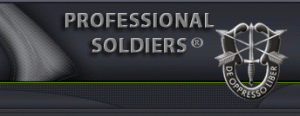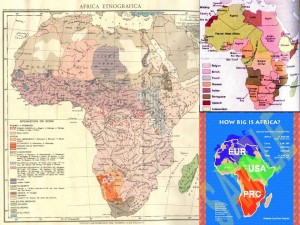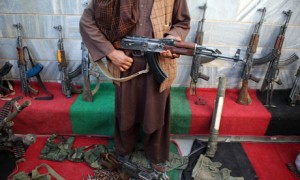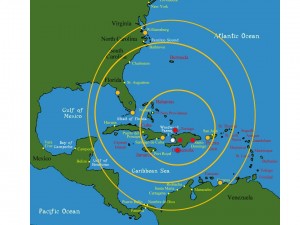
To Heal Haiti, Look to History, Not Nature (New York Times)
On Jan. 1, 1804, when Dessalines created the Haitian flag by tearing the white middle from the French tricolor, he achieved what even Spartacus could not: he had led to triumph the only successful slave revolt in history. Haiti became the world’s first independent black republic and the second independent nation in the Western Hemisphere.
Alas, the first such republic, the United States, despite its revolutionary creed that “all men are created equal,” looked upon these self-freed men with shock, contempt and fear. Indeed, to all the great Western trading powers of the day — much of whose wealth was built on the labor of enslaved Africans — Haiti stood as a frightful example of freedom carried too far. American slaveholders desperately feared that Haiti’s fires of revolt would overleap those few hundred miles of sea and inflame their own human chattel.
Haiti Numbers (Daily Gleaner Canada)
* Number of homeless in Haiti: 2 million, European Commission estimate.
* Total death toll roughly 200,000, estimate by the European Union, quoting Haitian officials.
* Other aid: UN World Food Programme has distributed 1.4 million ready-to-eat food rations, says 100 million will be needed over next 30 days to reach three million people in desperate need.
Major aftershock hits Haiti; assessment team making contact (Baptist Press)
The team arrived in Port-au-Prince Wednesday (Jan. 20) after a 17-hour, 160-mile trip in a four-vehicle caravan from Santo Domingo, Dominican Republic.
More than 40 significant aftershocks have hit since the Jan. 12 quake killed an estimated 200,000 people, injured 250,000 and left 1.5 million homeless.
The truck drivers are less and less willing to [drive into the city] as the situation in Port deteriorates.
Officials are concerned that the desperation people feel will boil over into violence. Looters by the hundreds have been fighting each other with broken bottles, clubs and other weapons over whatever goods they can still find in damaged stores.
Haiti DR planning slated Jan. 26 in Miami (Baptist Press)
Another assessment team member, Don Gann, disaster relief director for the Mississippi Baptist Convention, said the situation in Haiti remains fluid, chaotic and difficult. “[T]he traffic in Port-au-Prince is unbelievable,” Gann said. “Today, it took us three hours to go seven miles.
“There are security issues the teams need to be aware of. The situation is still precarious. A medical team or a feeding team could be overrun just because the people here have such great needs.”
Another assessment team member, Don Gann, disaster relief director for the Mississippi Baptist Convention, said the situation in Haiti remains fluid, chaotic and difficult. “[T]he traffic in Port-au-Prince is unbelievable,” Gann said. “Today, it took us three hours to go seven miles. ”
Haiti Earthquake update: cardboard communities
In this Haiti Earthquake update, The Christian Science Monitor reports that Haitians are building new homes after the earthquake with little more than cardboard and plastic in refugee camps. It's estimated that there are 250 such camps in existence.
The rich have left Haiti's capital city of Port-Au-Prince, leaving the poor to fend for themselves. Haiti Earthquake relief efforts are building, but with 3 million people in need of aide and a crumbled infrastructure, it's a challenge.
Update From Haiti: A Little Hope Today
Today felt like we made more progress and were able to create a little hope. We received some food from the United Nations and the Sisters of Charity, but most isn't getting to the people. Most is still in warehouses
Updates on the Crisis in Haiti
The volume of cases was truly overwhelming. We ran 2-3 operating rooms for 12-14 hours at a time, and didn’t even make a dent in the case load.
He added that “it was somewhat unclear” who was in charge of bringing patients injured to the hospital from hte earthquake zone. “
Update on the Progress of the US “Invasion”
Members of the 22nd Marine Expeditionary Unit launched two helicopters to resupply a U.N. distribution site with water.
Then came the earthquake victims, injured one week ago, ferried onboard by several helicopters. In all, the ship took in 19 patients after getting three Tuesday.
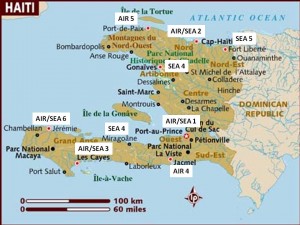 Phi Beta Iota Prognosis: In our over-all experience, absent a sea change in how the world community is approaching this, at least half the aid will be stolen or misappropriated; half the remaining aid dollars and materials will never get to the Hiatians at all. The prospects of a plague, riots, and other human break-downs increase every day. At this point in time neither the US nor Brazil nor the Cubans appear to have any of the following:
Phi Beta Iota Prognosis: In our over-all experience, absent a sea change in how the world community is approaching this, at least half the aid will be stolen or misappropriated; half the remaining aid dollars and materials will never get to the Hiatians at all. The prospects of a plague, riots, and other human break-downs increase every day. At this point in time neither the US nor Brazil nor the Cubans appear to have any of the following:
1. Multinational Information-Sharing and Sense-Making Center
2. Multinational Strategy, Operations Plan, or Tactical Lines of Engagement
3. Phase Plan for leveraging every air and sea entry point that makes sense
4. Phase Plan for actually getting minimal water and food to each of three million people for each of the next 30, 60, 90 days
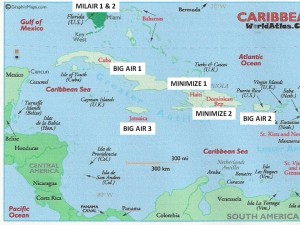 5. Strategy, Campaign Plan, or Logistics for applying aid dollars to the bottom-up reconstruction of Haiti in a manner that aggressively relocates 400,000 people not to temporary camps but to permanent opportunities with a virtually infinite supply of building materials aided by every Red Hat, See Bee and Army Engineer unit we can muster. This needs a Berlin Airlift degree of seriousness, a Marine Expeditionary Force level of complex simultaneous attention to detail, and a Whole of Government Multinational Engagement mind-set that we are simply not seeing.
5. Strategy, Campaign Plan, or Logistics for applying aid dollars to the bottom-up reconstruction of Haiti in a manner that aggressively relocates 400,000 people not to temporary camps but to permanent opportunities with a virtually infinite supply of building materials aided by every Red Hat, See Bee and Army Engineer unit we can muster. This needs a Berlin Airlift degree of seriousness, a Marine Expeditionary Force level of complex simultaneous attention to detail, and a Whole of Government Multinational Engagement mind-set that we are simply not seeing.
6. We know that the US Government is trying to share imagery and other information with selected partners both national and non-governmental but we don't see a coherent island-wide Information Operations (IO) endeavor, and we see ZERO in the way of “Strategic Communications” outlining in militarily precise terms where the bodies are, what percentage have been fed, etcetera. The absence of this information causes us great sadness, for it suggests that in all probability the US military is not treating this matter with the deep seriousness that it merits from a multinational public information-sharing and sense-making point of view.
